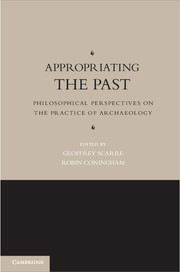Book contents
- Frontmatter
- Contents
- Contributors
- Editors
- Chapter 1 Introduction
- Part One Claiming the Past
- Part Two Problems of Meaning and Method
- Chapter 8 What Is a Crisis of Intelligibility?
- Chapter 9 Contesting Religious Claims over Archaeological Sites
- Chapter 10 Multivocality and “Wikiality”
- Chapter 11 “Do not do unto others…”
- Chapter 12 Should Ruins Be Preserved?
- Part Three Problems of Ownership and Control
- References
- Index
- References
Chapter 8 - What Is a Crisis of Intelligibility?
Published online by Cambridge University Press: 05 December 2012
- Frontmatter
- Contents
- Contributors
- Editors
- Chapter 1 Introduction
- Part One Claiming the Past
- Part Two Problems of Meaning and Method
- Chapter 8 What Is a Crisis of Intelligibility?
- Chapter 9 Contesting Religious Claims over Archaeological Sites
- Chapter 10 Multivocality and “Wikiality”
- Chapter 11 “Do not do unto others…”
- Chapter 12 Should Ruins Be Preserved?
- Part Three Problems of Ownership and Control
- References
- Index
- References
Summary
We are creatures who, at least up to a point, seek to understand ourselves and the world we inhabit. This is not just a deep psychological or social need; it is who we are. And, essentially and a priori, we make sense of who we are in part by making sense of who we were. Obviously, we are creatures who construct historical narratives, individual and social. But even when we are not explicitly thinking about our pasts, even when we are absorbed in the present or looking toward the future, a shadow of the past illuminates self-conscious life. Thinking is paradigmatically with concepts, and the capacity to acquire and deploy a concept is in part a capacity to acquire a sense of how the concept has been used. Even when the concept undergoes change, even when the past has been significantly misunderstood, our current use of concepts carries with it a sense of the past. So, for example, to understand myself as, say, currently reading a book is to understand myself as engaged with an artifact the likes of which others have engaged with before and, indeed, to be engaging with it in similar ways. To lose that sense of the past (however inchoate or implicit it might be) would be for self-consciousness to fall apart. This is not just an empirical, psychological point; it is a logical point about the structure of self-consciousness.
- Type
- Chapter
- Information
- Appropriating the PastPhilosophical Perspectives on the Practice of Archaeology, pp. 141 - 155Publisher: Cambridge University PressPrint publication year: 2012
References
- 1
- Cited by



